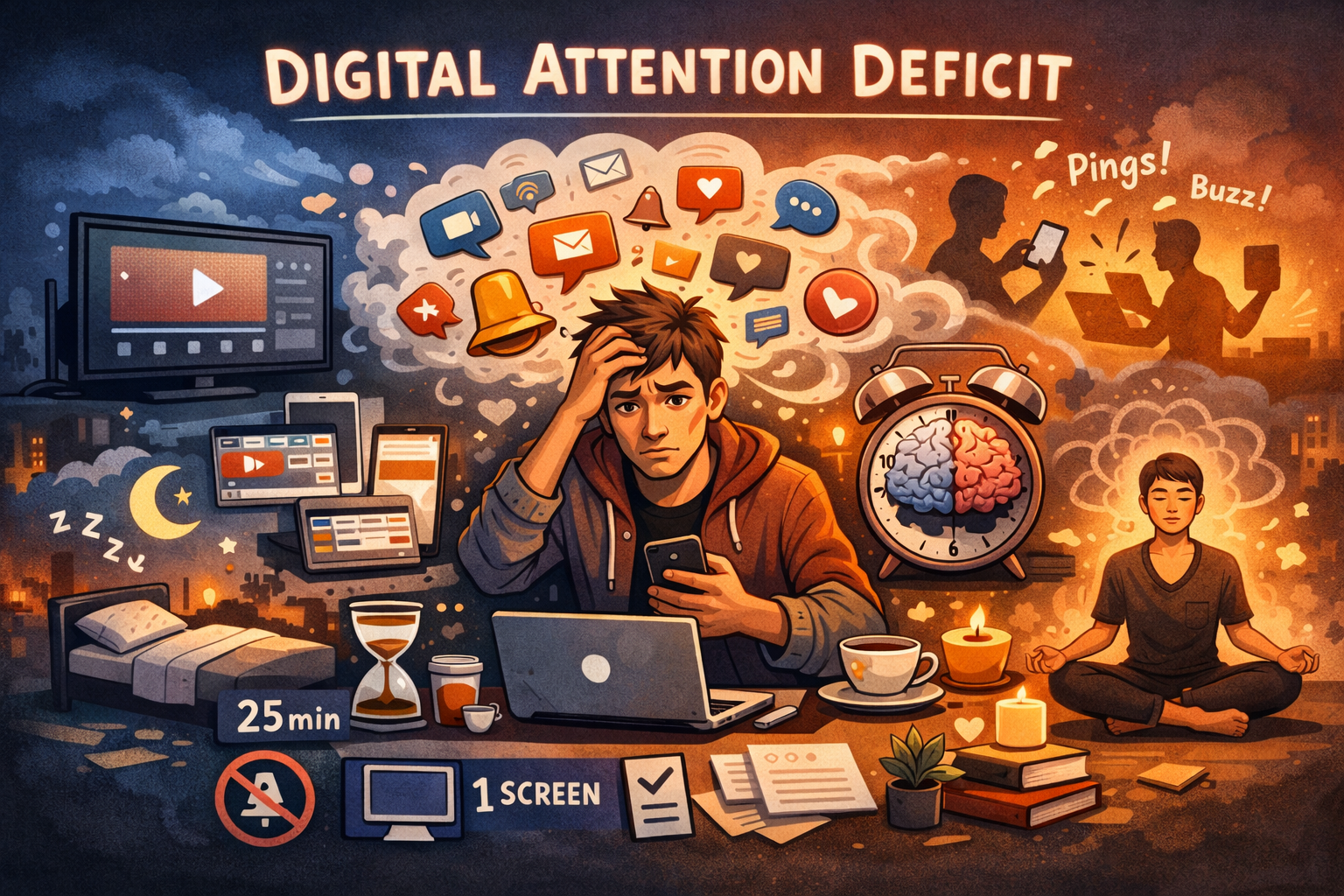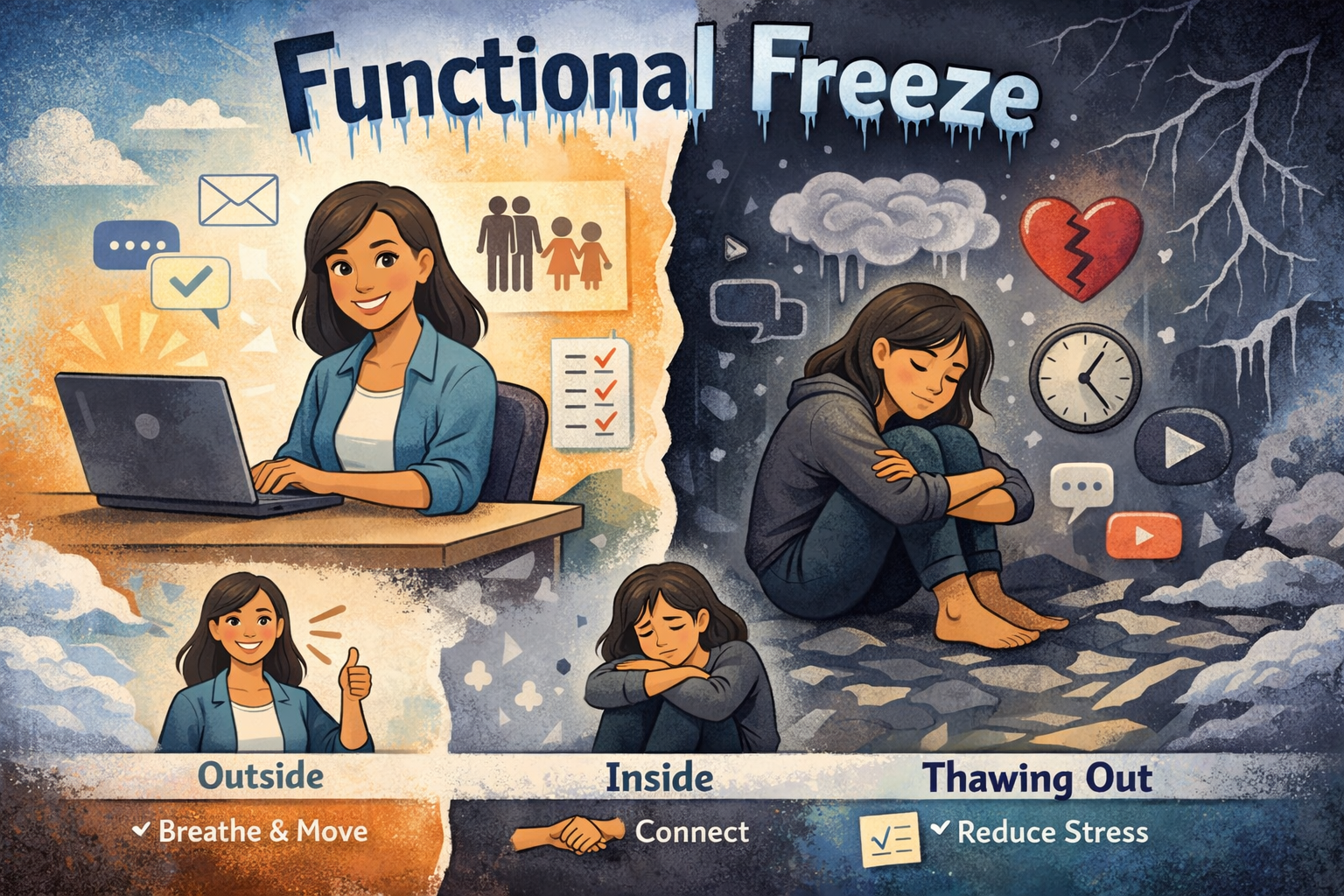The Constant Noise Within
In today's world, our mind keeps on thinking incessantly during waking hours. It rarely rests. From the moment we wake up, we are getting distracted with buzzing phone, endless notifications, and an overload of thoughts. Our minds jump from one set of thoughts to another like a monkey; planning, worrying, remembering, scrolling and what not.
We have become so used to this mental noise that silence feels boredom or even uncomfortable. We do not like solitude, sit in silence and hear our inner voice. But beneath all that mental noise lies something beautiful - clarity, peace, and a quiet inner voice that guides us toward what truly matters. The irony is that we cannot hear it because our minds are always too loud. When we slow down, that voice begins to whisper again.
As Eckhart Tolle reminds us, "Stillness is the language God speaks, and everything else is a bad translation."
Why Slowing Down the Mind Matters
Our mind is like a lake. When disturbed, the water becomes muddy, and we cannot see the reflection clearly. But when it becomes still, everything becomes visible.
Science now supports this ancient truth. A Harvard study published in Science (Killingsworth & Gilbert, 2010) found that nearly 47% of our waking hours are spent with wandering thoughts, often unrelated to what we are doing—and this mind-wandering is directly linked to unhappiness. When the mind slows down and stays present, happiness naturally rises.
Another study from Frontiers in Human Neuroscience (2014) showed that mindfulness and slow breathing reduce activity in the brain's default mode network—the part responsible for self-referential and repetitive thinking. In simpler terms, slowing down our thoughts literally quiets the brain's chatter.
Listening to Life's Whisper
When we slow down, life does not stop. In fact, it deepens. We begin to notice things we once rushed past: the rhythm of our breath, the rustling of leaves, the warmth of the sun, the tone in someone's voice.
In that space of awareness, we make better decisions, nurture relationships more gently, and reconnect with our authentic selves. We begin to hear life's whispers—the subtle cues that tell us when to rest, when to act, and what truly feels right.
As the poet Rumi said, "There is a voice that does not use words. Listen."
The Science of Stillness
Our nervous system has two primary modes: fight-or-flight (the stress response) and rest-and-digest (the relaxation response). When our mind races all day, our body stays trapped in a mild state of fight-or-flight. Over time, this leads to exhaustion, anxiety, and burnout.
Slow breathing and mindfulness activate the relaxation response, lowering cortisol levels and calming the heart rate. According to Harvard Medical School's Mind-Body Medicine research, deep breathing for just 10 minutes a day can significantly lower stress markers and improve emotional regulation.
Even corporate leaders are waking up to this truth. Companies like Google and Intel now offer mindfulness programs to employees, recognizing that calm minds make wiser choices, not just faster ones.
From Doing to Being
We live in a culture that glorifies busyness. We measure our worth by how much we do, not how deeply we live. But slowing down does not mean doing less, it means doing things with awareness.
Imagine drinking your morning tea slowly, really feeling its warmth and taste, instead of rushing to the next task. Imagine working with full focus, free of distraction. Imagine walking without your phone, just listening to the world around you.
In those moments, life feels richer because we are finally present for it.
As Thich Nhat Hanh beautifully wrote, "When we are mindful, deeply in touch with the present moment, our understanding of what is going on deepens, and we begin to be filled with acceptance, joy, peace, and love."
Practical Ways to Slow Down the Mind
-
Start your day in silence. Before checking your phone, take five minutes to breathe slowly and set an intention for the day.
-
Practice deep breathing. Try the 4-7-8 technique—inhale for 4 seconds, hold for 7, and exhale for 8. Repeat three times.
-
Be mindful in routine tasks. Whether washing dishes or walking, focus on your breath and movements.
-
Limit mental clutter. Write down your thoughts before bed or journal for five minutes to clear the mind.
-
Spend time in nature. Nature has a natural rhythm that helps the mind slow down and reset.
The Quiet Mind, The Loud Life
When our mind slows down, we stop chasing and start living. We begin to experience life as it truly is—not as our thoughts project it to be. We notice the small miracles that were always there—the smile of a stranger, the calm of a sunset, the wisdom of silence.
True clarity comes not from thinking harder, but from thinking less. The mind is a powerful tool, but only when it serves us, not when it controls us.
When life feels overwhelming, remember this simple truth: the quieter the mind becomes, the louder life speaks.
Final Thought
As Lao Tzu once said, "To the mind that is still, the whole universe surrenders."
Let us learn to listen—not to the noise in our heads, but to the music of life that plays softly underneath it.
Are you looking for inner peace, deep relaxation or holistic solutions for mental health? Visit http://themindtherapy.in - your space for online counselling/therapy, free mental health tests, meditation, sound therapy etc.
Mind Therapy is India's trusted platform for mental health, mindfulness, and holistic healing. Explore expert-led programs, guided meditation, sound therapy and counselling at http://themindtherapy.in














